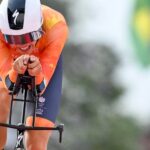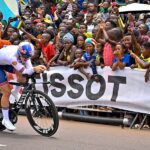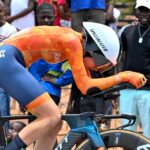
The 2025 Vuelta a España had all the ingredients to be a classic — daring course design, underdog stage wins, and a GC battle that promised to break the Jonas-Tadej duopoly. Joao Almeida pushed Jonas Vingegaard to the limit, Tom Pidcock lit up the race with fearless attacks, and rising talents like Matthew Riccitello and Torsten Træen delivered breakthrough rides. But instead of a three-week fiesta, the Vuelta became defined by chaos, with protests disrupting stages, neutralizing finales, and ultimately robbing fans and riders of the spectacle this race was meant to be.
When we checked in on the first rest day of this year’s Vuelta a España, we had the makings of a classic grand tour on our hands. The race had featured some of the unique and often stunning course designs it has become famous for, underdogs were snatching stages, and the closest GC battle of the year was approaching a boiling point. When Joao Almeida was able to go pedal stroke for pedal stroke with an attacking Jonas Vingegaard and hold him at arm’s length on stage nine’s mountains, I started to believe that Visma’s odds-on favorite was vulnerable. I thought, if any race can upset the grand tour duopoly of Jonas and Tadej, it would be the explosive and unpredictable Vuelta.
 Vingegaard leading the peloton on stage 9.
Vingegaard leading the peloton on stage 9.
The race was on in the closing kilometers of stage eleven as Q.365’s Tom Pidcock traded furious pulls with Vingegaard, distancing Almeida and threatening to make it a three-way battle for the leader’s red jersey. In an instant, though, the stage’s finale and perhaps the narrative value of the entire Vuelta were shattered as protests forced the cancellation of the finish.

From that point on, Vingegaard put on an unflappable, if not dominant display that gradually suffocated the spectacle of the GC battle. Every taste of excitement came with the looming spectre of more criminal interference with the race. Pidcock joined the elite club of riders who have distanced Jonas on a climb but couldn’t quite crack the two-time Tour winner.
 Almeida kept the pressure on
Almeida kept the pressure on
Even on the stage eighteen time trial, Almeida began putting dangerous seconds into Vingegaard’s lead only to have his conquest snuffed out by a protest-shortened course. Almeida could well have closed within ten or twenty seconds of the red jersey before the final weekend if the race had taken on the planned twenty-seven kilometers. Instead, we were left with a laughable twelve-kilometer race distance.

There were mentions of a third-week illness for both Almeida and Vingegaard, which could have contributed to the malaise late in the race. I never had the good fortune to get the type of sickness that allows you to keep on smashing climbing records at 6.5+ watts/kg. These guys are built different.

There was even a wonderfully nostalgic showdown between two former superstars on stage sixteen as Ineos legend Egan Bernal traded blows mano a mano with Soudal Quickstep’s often famously imprisoned Mikel Landa. Protests reduced that stage finish to a glorified club ride sprint up a short, anonymous hill. The final sprint and even the crowning of this edition’s deserving champions was also stolen from fans to punctuate the most dissatisfying grand tour in recent memory.

The Protests
That may sound like an overly negative assessment of the second half of this Vuelta, but I don’t think the chaotic unwinding of the race should be understated. This race was a disaster. I’ve seen it referred to as a farce, but that implies some suggestion of absurd entertainment. This was a catastrophe.
The loss of entertainment pales in comparison to what the riders, the host cities, and innocent spectators were subjected. The “Pro-Palestine” protests were organized, escalating attacks on the race. We’ve seen roads annoyingly blocked in races for decades, finish-line protests too, but nothing like this. Hinault’s infamous fisticuffs with a union protester seem quaint in comparison.
In Bilbao, we saw barriers pushed in at passing riders by an ominous mass of uniform “protesters”, tellingly all sporting identical flags. A few stages later, we saw a member of the cause lie in wait and launch himself at an unsuspecting rider passing at 50 km/h. We saw the same again days later at a roundabout. As a racer who very nearly died in a crash I couldn’t have seen coming, this is when the Vuelta lost its last shred of credibility. In an era when “Rider Safety” is a buzzword, riders were exposed to potentially lethal aggravated assault, and the governing bodies’ response was to shorten stages and offer empty apologies.
Race Director Javier Guillen complained in interviews that he could not force Israel Premier Tech to abandon the race and appease the activists. IPT decided to remove the word “Israel” from their kits in an attempt to quell the disruption. Clearly, neither of them has heard of the rule to “Not negotiate with protesters.” . The race relied on the Spanish police to manage the criminal activity, but their efforts were stunted and rarely successful.
When the infamous “Allez Omi and Opi” incident took out riders in the Tour a few years ago, there was outrage, and the authorities jailed and charged the inattentive spectator. In the Vuelta, we didn’t hear names, or charges or individual admonitions- just the word “protesters” over and over.
As UAE’s double stage winner, Juan Ayuso, wisely noted after the finish in Madrid, “there are many sports in which Israeli teams compete, but it seems only the Vuelta is affected (like this)”. The Vuelta, the Spanish government, and the UCI, who watched it all happen, need to answer some tough questions before racing can return.
 Matthew Riccitello took his spot among the leaders and never let go.
Matthew Riccitello took his spot among the leaders and never let go.
Breakthroughs and Redemptions
Beneath the layers of controversy and frustration, the Vuelta did at least provide some refreshing storylines of breakthrough performances. Bahrain Victorious rider Torsten Traen played the ultimate underdog, wearing the red jersey for several days and then doggedly holding onto an incredible top-ten GC position. Israel Premier Tech’s American super-climber Matthew Riccitello methodically stalked the big guns for three weeks and announced his arrival as a bona fide contender with the fifth overall and the White Jersey. Jay Vine recaptured his dominant power with a slew of impressive rides, contributing to an astonishing seven stage wins for his UAE squad.

Redbull Bora delivered a pair of outstanding GC results. Twenty-one-year-old Giulio Pelizzari confirmed his sixth place overall at the Giro with a matching sixth in the Vuelta. Giro winner Jai Hindley took on an inspiring battle for the podium and grabbed fourth overall after a tumultuous couple of seasons. Hindley couldn’t dislodge Tom Pidcock, who proved many speculators wrong by finally taking a fine podium spot in third. Pidcock might have been the man of the race, launching audacious attacks whenever he was able, and a beautiful stage win that wasn’t to be.

The 2025 Vuelta had the protagonists, the course, and the inspiration to be a classic edition. While we were treated to bright moments, we saw far too many dark ones-making this a Vuelta to forget.
Thanks to everyone for reading along and following our coverage.
The post La Vuelta’25 Wrap: Protests, Chaos, and Breakthrough Performances in a Grand Tour to Forget appeared first on PezCycling News.





